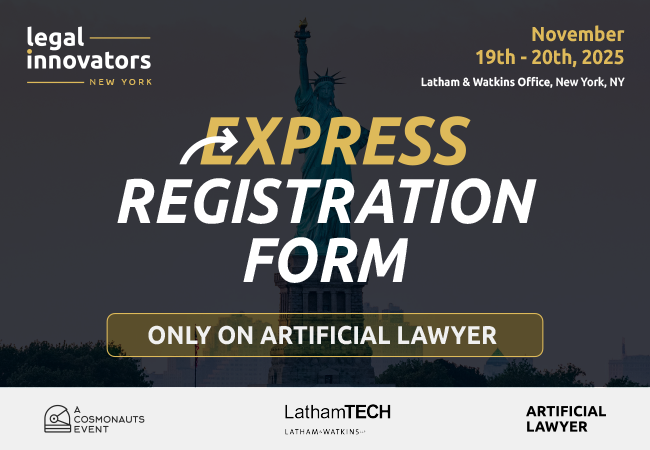
A lawyer told me recently that they would rather use AI than give work to a new junior associate. Here’s how they explained it.
The lawyer, whose firm I won’t mention, said that they’ve been super-busy recently and the firm offered to hire an additional junior associate to help out, given how much there was to do within their team. Meanwhile, the firm has also brought in – as many have now – a legal AI productivity platform, which has been well-received.
Initially, the lawyer was not that excited about using AI, but after trying it out soon found that it was remarkably useful. Now they use it very often and especially for the more laborious ‘manual’ legal tasks that juniors might normally do.
‘The AI is just as good as a junior lawyer,’ they explained, and mentioned a couple of very time-consuming tasks as examples where the AI had made a huge difference.
They noted how on one particularly arduous, yet essential, task a young associate had done their best, but even so the more experienced lawyer had been forced to spend a long time reworking what they’d handed over.
And now here comes the clincher….
The more senior lawyer said they really didn’t enjoy having to show the young lawyer that they’d not done a good job – something they had to do for multiple professional reasons. (After all, in law there is no point saying ‘Perfect, more like that, please!’ when the work product is missing key facts and could scupper a project.) That very human side of the job was just not something they wanted to deal with.
It was uncomfortable, the lawyer added, and they also worried about the risk of supervising lawyers being seen as too critical of junior associates these days and hurting their feelings.
Now, this is where it gets really interesting. They concluded that, if:
- The AI is ‘as good as a junior associate’ on a range of entry level tasks, and also super-fast, then there was no reason not to use the tech solution. This was so even if it made errors, because those errors could be corrected very quickly as well, by going back to the AI and running improved prompts.
And,
- While it was true that a junior lawyer could do the work, the result would be no better than the AI, and it would take a lot, lot longer. Plus, perhaps they may make multiple errors that would also take a lot of time to correct – if done without AI. On balance, the AI was definitely faster, even if you factored in a certain error level.
Now, that alone one could win the argument for some. But, here is the key point according to the senior lawyer:
- All things being equal, if the junior lawyer and the AI made the same amount of mistakes, and the AI is a lot faster and can correct faster as well, and there is also no need to handle the emotional stress of the unhappy junior whose work has been sent back, then – the senior lawyer argued – it’s simply easier to just use the AI and not ask for any additional help.
Now, you could say: but it’s the senior lawyer’s job to teach the new lawyer; they should expect mistakes; they should accept that things will take a lot longer than AI; and they need to get used to the emotional load of working with associates who are still learning the trade. That’s law firm life, that’s how things work, training is part of the job description.
And that may be true, but the challenge is that AI is now here, and it works well. Not perfectly, but well enough to make some senior lawyers turn to it in preference to a junior lawyer because for some it’s the legal work path of least resistance.
Conclusion
If you were to put in their shoes what would you do? Some perhaps love the educational aspect of helping to train up a junior lawyer and may not see what the fuss is about. Others may nod in sympathy and might feel the same way. Some may not even mind a smaller junior associate cohort in future either.
Of course, talk of taking on less juniors is fraught with multiple issues. There are also the important economic aspects of how to make money as a law firm if you stop building out a large leverage model, which can then be billed to the clients based on the time taken to do tasks. Plus, who becomes the partners of the future if you reduce junior hires? But then, for some lawyers in the middle of a major deal, and who are intensely engaged in the here and now, the wider economic issues may not be their primary concern. AI may be what they really want to turn to instead when in the midst of a deal.
In short, this lawyer has stumbled upon an issue that many law firms are only just starting to consider: that legal AI tools are so good now and so too the foundation models they’re based on (see the results for GPT 5.1 for example), that it’s not just the clients who may grumble about ‘training junior lawyers on my work when you could be using AI’, it’s some of the more senior lawyers at law firms as well who are wondering if there is a better way of doing things. And that’s going to be a very difficult dilemma to navigate for all involved as it goes right to the heart of legal education and training.
To be continued.
Richard Tromans, Founder, Artificial Lawyer.
–
This and other key subjects related to legal AI will very likely be discussed at Legal Innovators New York – this week, Nov 19 and 20 in Midtown. More info here:
Legal Innovators New York Conference – is next week, Nov 19 and 20
To help you get RSVP-ed for the landmark event in the heart of Midtown, and which will be packed with excellent speakers and tech companies from across the industry, we have created a special Express Registration for speedy boarding.

—
Discover more from Artificial Lawyer
Subscribe to get the latest posts sent to your email.